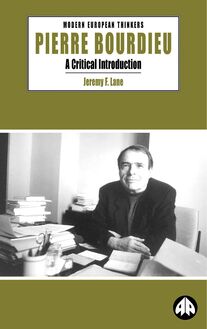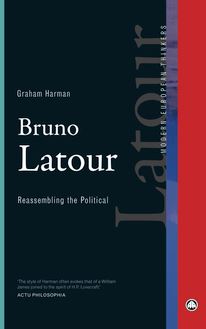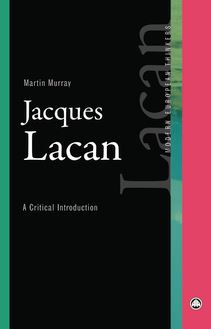-
 Univers
Univers
-
 Ebooks
Ebooks
-
 Livres audio
Livres audio
-
 Presse
Presse
-
 Podcasts
Podcasts
-
 BD
BD
-
 Documents
Documents
-
- Cours
- Révisions
- Ressources pédagogiques
- Sciences de l’éducation
- Manuels scolaires
- Langues
- Travaux de classe
- Annales de BEP
- Etudes supérieures
- Maternelle et primaire
- Fiches de lecture
- Orientation scolaire
- Méthodologie
- Corrigés de devoir
- Annales d’examens et concours
- Annales du bac
- Annales du brevet
- Rapports de stage
La lecture à portée de main
Vous pourrez modifier la taille du texte de cet ouvrage
Découvre YouScribe en t'inscrivant gratuitement
Je m'inscrisDécouvre YouScribe en t'inscrivant gratuitement
Je m'inscrisEn savoir plus
Vous pourrez modifier la taille du texte de cet ouvrage
En savoir plus

Description
Guattari's main works were published in the 1970s and 1980s. His background was in psychoanalysis -- he was trained by Lacan and he practised as a psychoanalyst for much of his life. He developed a distinctive psychoanalytic method informed always by his revolutionary politics.
Guattari was actively involved in numerous political movements, from Trotskyism to Autonomism, tackling ecological and sexual politics along the way. A true believer in collectivity, much of his work was written in collaboration, most famously with Gilles Deleuze.
This is also an introduction to key concepts such as schizoanalysis, transversality, a-signifying semiotics and various kinds of machine.
Introduction
1. The Formation of a Young Militant
2. Transversality and Politics
3. Subjectivity, Art, and Ecosophy
4. A-signifying Semiotics
5: Informatic Striation
6. Minor Cinema
7. Affect and Epilepsy
Conclusion
References
Index
Sujets
Informations
| Publié par | Pluto Press |
| Date de parution | 20 avril 2009 |
| Nombre de lectures | 0 |
| EAN13 | 9781783714506 |
| Langue | English |
Informations légales : prix de location à la page 0,1850€. Cette information est donnée uniquement à titre indicatif conformément à la législation en vigueur.
Extrait
Félix Guattari
Modern European Thinkers
Series Editors: Anne Beech and David Castle
Over the past few decades, Anglo-American social science and humanities have experienced an unprecedented interrogation, revision, and strengthening of their methodologies and theoretical underpinnings through the influence of highly innovative scholarship from continental Europe. In the fields of philosophy, post-structuralism, psychoanalysis, critical theory, and beyond, the works of a succession of pioneering writers have had revolutionary effects on Anglo-American academia. However, much of this work is extremely challenging, and some is hard or impossible to obtain in English translation. This series provides clear and concise introductions to the ideas and work of key European thinkers.
As well as being comprehensive, accessible introductory texts, the titles in the ‘Modern European Thinkers’ series retain Pluto’s characteristic radical political slant, and critically evaluate leading theorists in terms of their contribution to genuinely radical and progressive intellectual endeavor. And while the series does explore the leading lights, it also looks beyond the big names that have dominated theoretical debates to highlight the contribution of extremely important but less well-known figures.
Also available
Alain Badiou Jason Barker
André Gorz Conrad Lodziak and Jeremy Tatman
Georges Bataille Benjamin Noys
Jürgen Habermas Luke Goode
Jean Baudrillard Mike Gane
Guy Hocquenghem Bill Marshall
Walter Benjamin Esther Leslie
Julia Kristeva Anne-Marie Smith
Pierre Bourdieu Jeremy F. Lane
Slavoj Žižek Ian Parker
Gilles Deleuze John Marks
Félix Guattari
A Critical Introduction
GARY GENOSKO
First published 2009 by Pluto Press 345 Archway Road, London N6 5AA and 175 Fifth Avenue, New York, NY 10010
www.plutobooks.com
Distributed in the United States of America exclusively by Palgrave Macmillan, a division of St. Martin’s Press LLC, 175 Fifth Avenue, New York, NY 10010
Copyright © Gary Genosko 2009
The right of Gary Genosko to be identified as the author of this work has been asserted by him in accordance with the Copyright, Designs and Patents Act 1988.
British Library Cataloguing in Publication Data A catalogue record for this book is available from the British Library
ISBN 978 0 7453 2821 8 Hardback ISBN 978 0 7453 2820 1 Paperback ISBN 978 1 8496 4409 9 PDF eBook ISBN 978 1 7837 1451 3 Kindle eBook ISBN 978 1 7837 1450 6 EPUB eBook
Library of Congress Cataloging in Publication Data applied for
This book is printed on paper suitable for recycling and made from fully managed and sustained forest sources. Logging, pulping, and manufacturing processes are expected to conform to the environmental standards of the country of origin. The paper may contain up to 70 per cent post-consumer waste.
10 9 8 7 6 5 4 3 2 1
Designed and produced for Pluto Press by Chase Publishing Services Ltd, Sidmouth, England Typeset from disk by Stanford DTP Services, Northampton, England Printed and bound in the European Union by CPI Antony Rowe, Chippenham and Eastbourne
CONTENTS
Acknowledgments
Introduction
1.
The Formation of a Young Militant
2.
Transversality and Politics
3.
Subjectivity, Art, and Ecosophy
4.
A-signifying Semiotics
5.
Informatic Striation
6.
Minor Cinema
7.
Affect and Epilepsy
Conclusion
Notes
List of References
List of Media
Index
ACKNOWLEDGMENTS
I began work on this book in earnest while I was in Sydney, Australia in 2006 as a visitor in the Department of Philosophy at the University of New South Wales and the Department of Art History and Theory at the University of Sydney. I am grateful for the personal and professional assistance graciously provided by Paul Patton and Alan Cholodenko. Andrew Murphie warmly welcomed me into his intellectual community, and Ross Harley was extremely generous with his time and energy. I was able to present some earlier versions of chapters at the Universities of Melbourne, Monash, and RMIT (Royal Melbourne Institute of Technology) thanks to the kind invitations of Felicity Colman, Anna Hickey-Moody, and Hélène Frichot. In the arts field, I was helped along my way by Maria Fernanda Cardoso and Elizabeth Day. The intellectual camaraderie of Melissa McMahon and Roger Dawkins was vital.
I am indebted to the research assistance of Adam Bryx, and to an ongoing dialogue about the expanding fields of transversality with Bryan Reynolds. Paul Hegarty was indispensable in helping me acquire European materials. I would also like to thank the four reviewers of this project for their good advice, and David Castle at Pluto Press for bringing the project to fruition.
Finally, I want to dedicate this book to the irrepressible Iloe.
INTRODUCTION
Overview
The late French activist–intellectual Félix Guattari (1930–92) is perhaps best known for his collaborations with philosopher Gilles Deleuze on a series of groundbreaking books in post-’68 French thought around the sprawling thematic of capitalism and schizophrenia. There was much more to Guattari than this collaboration, however, including numerous other joint and group projects with philosophers Antonio Negri and Eric Alliez, to name only two. Guattari’s aberrant career path led him to take up psychoanalysis; he was trained by Jacques Lacan, with whom he had a stormy relationship, and worked with the Lacanian analyst Jean Oury at the Clinique de la Borde in Cour-Cheverny, originally a private clinic shrouded in myth and supercharged with as much intellectual cachet as terror, for most of his adult life. He also had his own private practice. Guattari died at La Borde in 1992 at the age of 62. He is buried in Père Lachaise cemetery in Paris. The evening of his death on August 28, as remembered by Labordian Marie Depussé, began with an ordinary meeting during which Félix fielded concerns from a number of patients and proffered solutions designed to elicit the participation of those either disinclined or incapable of such engagement:
Félix died that night.
He always thought that there could be a dialogue between groups of speaking patients and the most withdrawn and delirious. Not any groups, he said, but those which ‘allow to surface the most accomplished image of human finitude, every undertaking of my own finds itself dispossessed in the name of an instance more implacable than my own death, that of its capture by the existence of others …’
The next day in the lounge the inmates cried when O[ury] told them of Félix’s death.
‘Thank you for telling us like that,’ they responded. In exchange, even if many wandered that night, unable to sleep, they did so politely, tenderly, without a sound. The night was calm. 1
Guattari was a restless experimenter, an habitué of far-left groups from his earliest years; a militant suburban Trotskyite in the late 1940s who was labeled a ‘dangerous “Titoist” propagandist’ 2 (that is, anti-Soviet and imperialist) by angry and likely paranoid, thought Guattari, youth members of the French Communist Party; and a supporter of a myriad of good, lost, and forgotten causes, not to mention a vocal and visible agitator for progressive social and political change in Europe and elsewhere. His stomping grounds were not the universities, except when they were reeling from social upheavals or fraying at the edges as knowledge made its difficult passage into society and social change disrupted the prerogatives of the ivory tower, but the little journals (beginning with a Trotskyite bulletin in the 1950s, for which he wrote under a pseudonym), the transdisciplinary research groups, social experiments and public protests. As a committed intellectual he modeled himself on Jean-Paul Sartre, even during a time when Sartre had fallen out of favor and to speak of engagement was a provocation. Yet Guattari cites so many influences that it is impossible to categorize him simply as Sartrean. He lived in multiple worlds – young philosophy student at the Sorbonne and militant on the fringes of communism, visiting Yugoslavia and China, and strong adherent to Lacanian structural psychoanalysis by 1954 (spending hundreds of hours talking with Jean Oury at the psychiatric clinic in Saumery). He once referred to himself as a Leninist who was not very Leninist because he didn’t believe in centralism, calling it an absurdity, and found the organized party as a detachment from the working class – ten wise men pulling proletarian strings – equally so; this was not unlike his Italian colleague Franco Berardi’s self-description as ‘more hippie [sometimes Buddhist] than Bolshevik.’ 3 Guattari even considered his Trotskyism to be ‘ambivalent.’ 4 He was not at all ambivalent about the camaraderie he found among his ‘young ajiste [hostellers] mates’ from the youth hostelling movement, another important trying ground. In the early 1960s, for example, Guattari was also a Maoist of sorts, assisting in the founding of the ‘Comité d’initiative pour une association populaire franco-chinoise,’ whose newspaper Bulletin d’information was very short-lived, with his old friend Jean Baudrillard. 5
By the mid 1960s Guattari had developed a formidable battery of concepts organized around the problem of delivering therapy in institutional settings. Psychanalyse et transversalité (1972) exposed the limits of the psychoanalytic unconscious by arguing that it was not a concern of specialists treating individuals but rather perfused the social field and history. For Guattari the subject was a group or collective assemblage of heterogeneous components whose formation, de-linked from monadic individuals and abstract, universal determinations like the Oedipus myth, allegedly rigorous uses of mathematical symbols, Lacan’s so-called ‘mathemes,’ 6 and part-objects (not partial objects lacking wholes), could be seen through critical analyses of the actual vicissitudes of colle
-
 Univers
Univers
-
 Ebooks
Ebooks
-
 Livres audio
Livres audio
-
 Presse
Presse
-
 Podcasts
Podcasts
-
 BD
BD
-
 Documents
Documents
-
Jeunesse
-
Littérature
-
Ressources professionnelles
-
Santé et bien-être
-
Savoirs
-
Education
-
Loisirs et hobbies
-
Art, musique et cinéma
-
Actualité et débat de société
-
Jeunesse
-
Littérature
-
Ressources professionnelles
-
Santé et bien-être
-
Savoirs
-
Education
-
Loisirs et hobbies
-
Art, musique et cinéma
-
Actualité et débat de société
-
Actualités
-
Lifestyle
-
Presse jeunesse
-
Presse professionnelle
-
Pratique
-
Presse sportive
-
Presse internationale
-
Culture & Médias
-
Action et Aventures
-
Science-fiction et Fantasy
-
Société
-
Jeunesse
-
Littérature
-
Ressources professionnelles
-
Santé et bien-être
-
Savoirs
-
Education
-
Loisirs et hobbies
-
Art, musique et cinéma
-
Actualité et débat de société
- Cours
- Révisions
- Ressources pédagogiques
- Sciences de l’éducation
- Manuels scolaires
- Langues
- Travaux de classe
- Annales de BEP
- Etudes supérieures
- Maternelle et primaire
- Fiches de lecture
- Orientation scolaire
- Méthodologie
- Corrigés de devoir
- Annales d’examens et concours
- Annales du bac
- Annales du brevet
- Rapports de stage

















